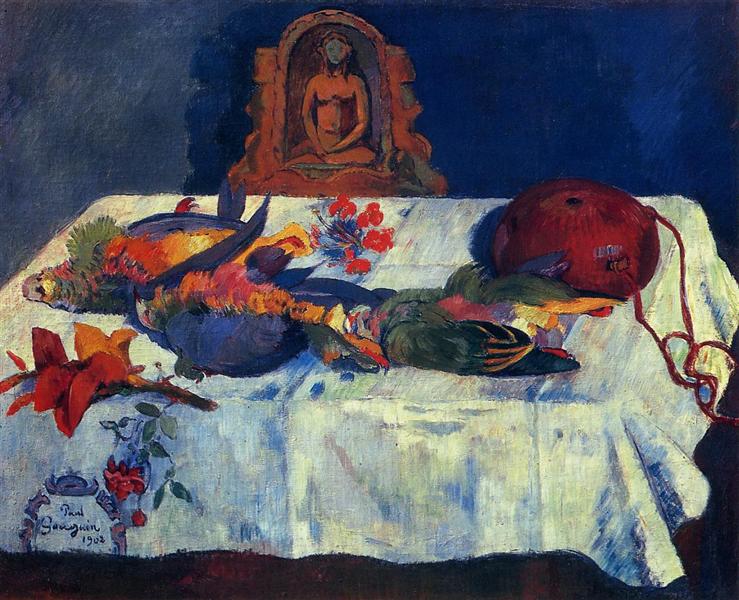תיאור
Paul Gauguin's Still Life With Parrots, painted in 1902, is a memorable depiction that embodies many of the artist's signature style and themes that obsessed him throughout his career. The painting reveals Gauguin immersed in his search for symbolism and a deeper connection with nature, removed from the superficial truths of the modern world.
The composition of the work is notable for its clarity and focus on simplicity. In the center, two vibrant parrots unfold in a display of color and movement, bringing with them the energy and exotic feel of tropical nature. These animals are surrounded by a variety of botanical elements, suggesting a rich and fertile environment. The still life is not just composed of fauna; mushrooms and other vegetation add an almost surreal dimension to the scene. Each of these components seems to be carefully considered, reflecting Gauguin’s ability to create a visual balance that does not lose the vibrant intensity for which his work is acclaimed.
Gauguin uses a bold colour palette, characteristic of his post-impressionist style. Shades of green, blue and red combine to bring the work to life, creating a contrast that is both appealing and dynamic. The strong application of colour is complemented by brush strokes that are clearly gestural, giving the work a sense of movement and organicity, breaking away from the rigidity of realistic representation. In this sense, Gauguin is not interested in just capturing a snapshot of nature, but in expressing an emotional experience through colour and form.
In Still Life with Parrots, the interaction between the parrots and their environment carries with it a sense of vitality, almost anecdotal. Although the parrots are not human characters, their presence in the painting evokes a connection between the animal and the human, suggesting a possibility of interspecies communication through the shared gaze of the observers. This implicit dialogue reflects one of Gauguin’s central concerns: the search for a spiritual connection with the world around him, a search that is often on display in his works, from his portraits to his still life pieces.
The work, created during his last stay in Tahiti, is a clear example of Gauguin's approach to life, culture and art. His aim to capture the essence of the primitive and the authentic often manifested itself in the depiction of the flora and fauna he encountered in the Pacific. In this painting, as in many of his other works from this period, one can sense the influence of non-Western aesthetic traditions, which so captivated him and led him to experiment with a new palette and a new visual language.
In short, “Still Life with Parrots” is not just a work of art; it is a reflection on nature, color, and perception. With Gauguin’s ability to fuse observation of daily life with a deeply emotional and symbolic impulse, this painting becomes an exploration of the natural world that goes beyond simple representation, inviting the viewer to contemplate the intrinsic beauty and complexity of life itself. With each brushstroke, the viewer is drawn into an ongoing dialogue between the visible and the felt, a constant in Paul Gauguin’s legacy.
KUADROS ©, a famous painting on your wall.
Hand-made oil painting reproductions, with the quality of professional artists and the distinctive seal of KUADROS ©.
Painting reproduction service with satisfaction guarantee. If you are not completely satisfied with the replica of your painting, we will refund 100% of your money.

